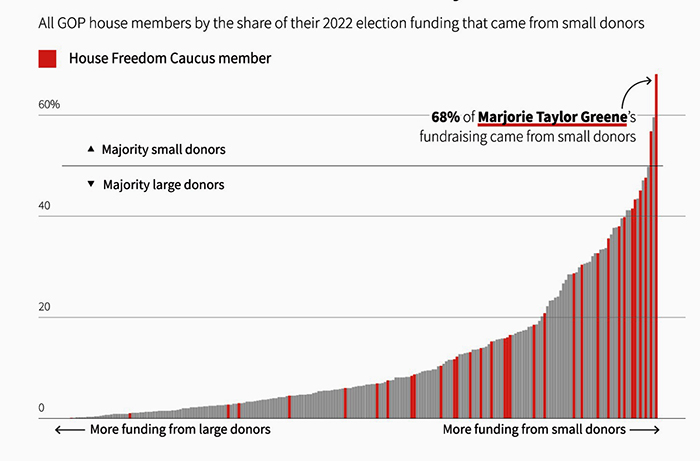

A substantial number of House Republicans are perfectly willing to push the country into default if Joe Biden won't gut Social Security and Medicare. Surely they know they will get blamed for the resulting worldwide depression. Why don't they care?
At least part of the answer lies in how campaigns are funded. It used to be that Republicans were largely funded by rich CEOs and other big business interests. Democrats got a lot of money from unions. That's not true anymore. Both parties now get much of their money from small donors through ActBlue and WinRed. This is especially true of the House Freedom Caucus, which leaders of big companies won't touch with a barge pole. They get all of their funding online from small donors. Also, nearly all of the them are in deep-red districts where whichever candidate has that little (R) after their name wins, no matter how crazy the candidate is. In other words, it used to be that the big donors kept the craziness in the closet by forcing the candidates to talk about their love of lower taxes, abolishing government regulations, and free trade. Now they don't have that power since the crazies are not expecting their money and certainly don't want it if it comes with strings attached.
This change in financing is why it took Speaker Kevin McCarthy (R-CA) 4 days and 15 ballots to get his job. In the past, the big donors would offer carrots or threaten sticks to keep the rank-and-file members in line. That doesn't work anymore. The only thing they are worried about now is a primary challenge from the right (except maybe Rep. Lauren Boebert, R-CO). And how do you get to the right of Reps. Andy Biggs (R-AZ), Matt Gaetz (R-FL), Jim Jordan (R-OH), or Marjorie Taylor Greene (R-GA)? There isn't a lot of room there.
Here is a bar chart that shows the effect quite clearly. There is a bar for each Republican House member, with the Freedom Caucus members in red and the others in gray. For each member, it shows what percentage of the member's financing came from small donors (people who gave less than $200). They are sorted on the x-axis from least dependent on small donors (on the left) to most dependent on small donors (on the right).

The "winner", that is, the member furthest to the right, is Marjorie Taylor Greene, who got 68% of her funding from donations under $200. Where the other 32% came from is not shown, but is likely to be mostly from donations under $500, not at $2,800. So she doesn't care if the leaders of big business don't want a depression. She doesn't care at all what they want and they have no leverage over her, as they did over Republicans 10 years ago. Rep. Jim Jordan (R-OH) came in second, with almost 60% of his funding from donations under $200. When Larry Roberts got the idea to build the ARPANET in 1967, he had no idea he was going to unleash a bunch of crazy people 50 years later. But without the Internet (which is the successor to the ARPANET), there would be no ActBlue or WinRed and none of this would have happened.
This analysis is not to say that big business is not in the picture anymore. There are many super PACs funded by rich CEOs and other millionaires and billionaires. It's just that the Freedom Caucus members don't need them and don't fear them. (V)